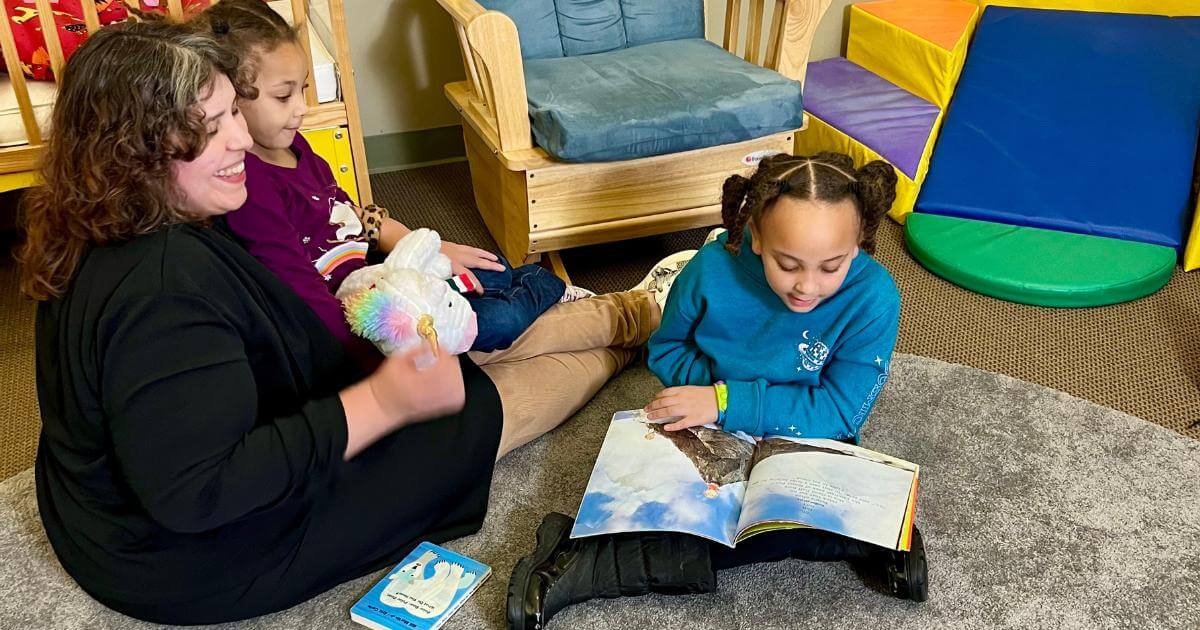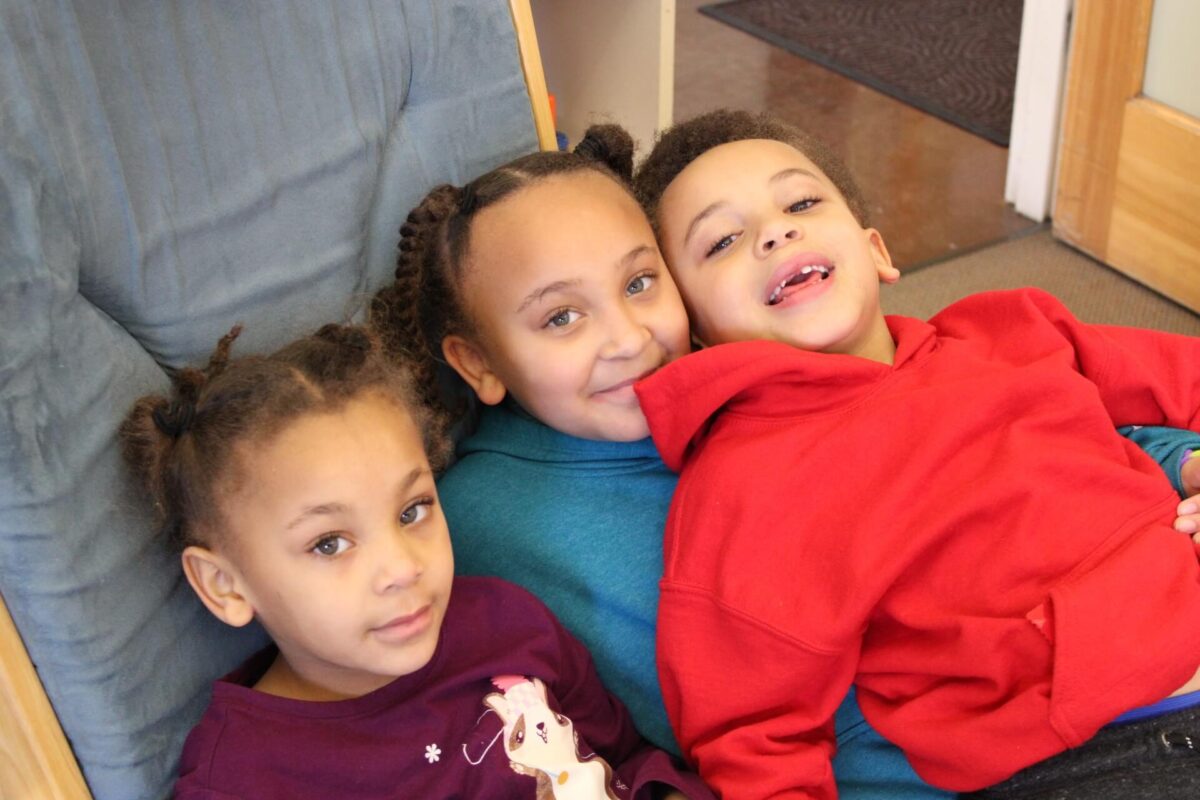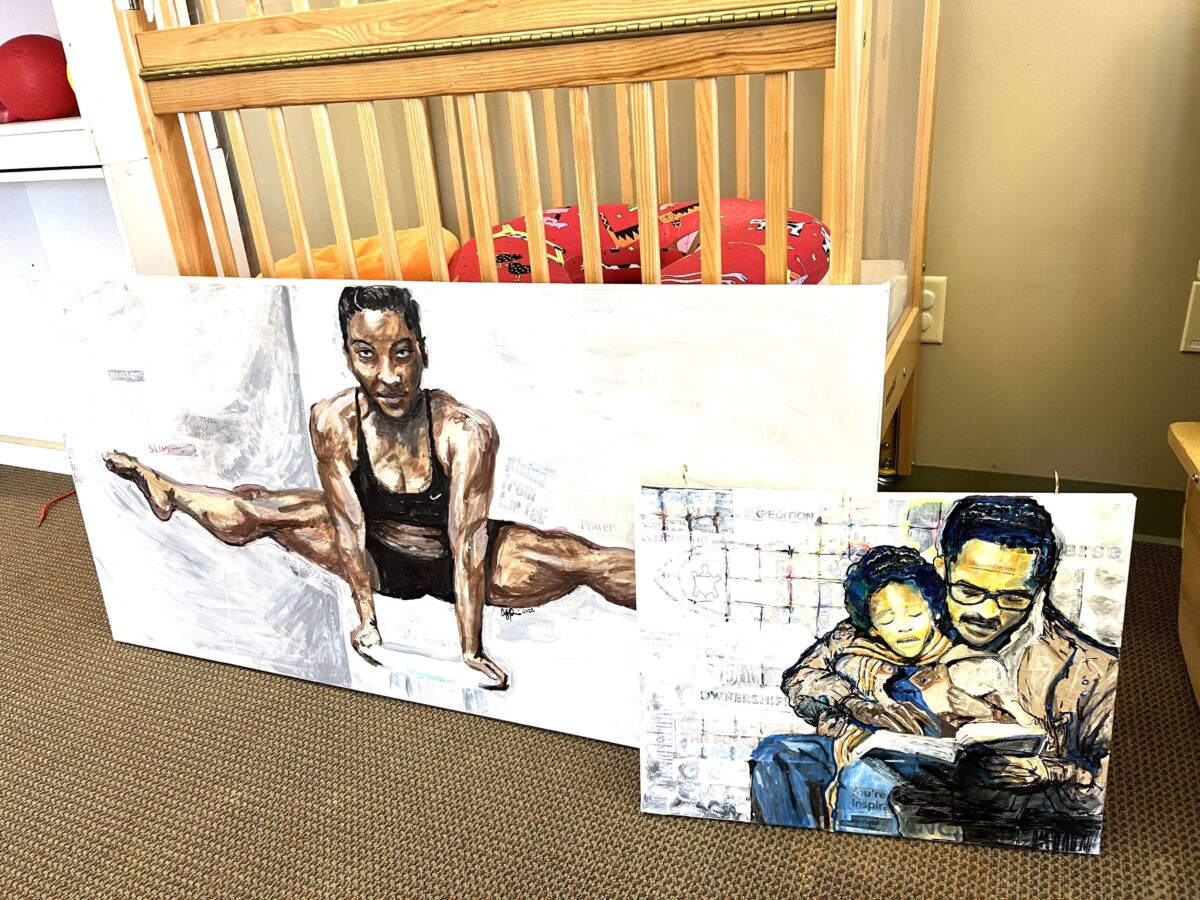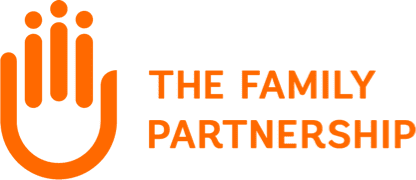Parenting for the Future: One Family’s 2Gen Success Story

We recently interviewed Amber Pierce, artist, entrepreneur, and graduate of The Family Partnership’s Parenting for the Future (PFF) home visiting program, about her experiences with TFP’s 2Gen programs. Amber joined us with her three children, sitting near two of Amber’s recent artworks, including a large collage and acrylic painting of Simone Biles. In this piece, Biles’ stares straight ahead in concentration, and her strong legs are stretched out to the sides as if in flight. Amber’s daughter, Aadon, was seated in front of the painting with her face just inches from the canvas when she turned to say with a smile, “That’s my mom’s art.” Later, we mentioned this moment to Amber who laughed and said, “To them, I’m the biggest thing ever.”
Watching Amber with her children, she appeared confident and completely present in her interactions with them. But that was not always the case. In 2018, Amber had Aadon, who was two at the time, and found out she was pregnant with twins. She said, “I felt like I didn’t have any of the things I needed.” She was overwhelmed and lacked childcare and support. A social worker mentioned The Family Partnership and Amber reached out for help. Amber has struggled with depression since she was young and sustained a Traumatic Brain Injury in a car accident in 2006. As a result, Amber struggles with routine and consistency in her daily life.
Iman Omer, Parent Educator in Parenting for the Future, began working closely with Amber and her children in 2022, providing support and services following a two-generation (2Gen) approach. A 2Gen approach serves both the needs of children as well as the needs of their parents and caregivers, recognizing that both are essential to moving a family forward. As one of TFP’s 2gen programs, PFF works with parents who have cognitive limitations that affect their parenting. The program provides parenting education, community resources, and joint activities for parents and children so they can connect and strengthen their relationship. While working with the parents on their parenting skills, parent educators also work to make sure that the children are developmentally on-track.
Iman visited Amber and the children weekly in their home and used the Circle of Security Curriculum, an 8-week course to help parents and caregivers connect with their children. Iman and Amber did a lot of parenting education work together, too. When Iman introduced the Circle of Security to Amber, they discussed the importance of understanding and meeting her kids’ physical and emotional needs. This includes providing a secure base to support their exploration and providing a safe haven to welcome them back. Amber was always comfortable with welcoming her kids back and providing that safe haven but she struggled with supporting their exploration. Specifically, she didn’t always enjoy certain activities with them, such as going to the park, because she was exhausted. Iman worked with Amber to set up a plan and routine that would allow her to get rest and feel energized so that she could enjoy outdoor activities with her kids. This is the type of concrete guidance that Amber found to be especially helpful.

Iman worked with Amber to build a supportive environment for her family. She connected Amber with a cleaning service, helped find preschool care for the twins, and supported Amber in finding a therapist through The Family Partnership. In addition, Amber attended the bi-weekly parenting support group. Parent Educators facilitate this group for parents, foster parents, and caregivers participating in TFP programs and is an opportunity for participants to connect and support each other.
The parenting group was an outlet for Amber to get out of the house with Aadon which gave them both a sense of routine. With Amber’s cognitive challenges, routine is very helpful. The family participated in activities and field trips with other families in the parenting group, which Amber found to be very beneficial in terms of consistency and social interaction. The support group also provided families with resources, a meal, and activity time. TFP staff provided free childcare on site, allowing Aadon, and eventually the twins, to connect to other children. It also allowed Amber and other parents to connect with each other. She said that this support was essential for her, and it gave her children a mom who had a long-term support system.
Today, Amber has gained confidence in her unique skills and role as a mother. She described her mental health and cognitive differences as “different wiring,” and that “it’s been important to honor my neurodivergence. I’ve not always been successful working a 9-5 job, so, I went into entrepreneurship…I’m always looking at ways to advance myself.”
I am able, I have to find my own way to navigate the journey.
Amber Pierce
Amber’s career has grown out of art which has always been a passion for her. She attended an arts and communications magnet school and later graduated from the Perpich Center for Arts Education. Amber found her voice working through her mental health issues and neurodivergence and creating art. “Art is an innate outlet for me.”
Amber uses collage and acrylic paints to create her pieces. She said she starts with a vision board and then “pours her intentions into the piece.” She asks herself, “Why am I creating this and what energy do I want to capture?”

Today, Amber has created an LLC called Creation Elevation and is working with a business coach. She hopes to continue to grow as an entrepreneur and would also like to include her family in her creative and entrepreneurial work.
Amber shares her story with others because she wants people to understand that “Neurodivergence is a wide spectrum and that people who struggle still want to make an impact on others.” She hopes to get rid of the stigma associated with mental health challenges and the need for support. She’s also vocal about the role that The Family Partnership played in her journey so far, “It gave my children kind of the peace of having a mom that had a support system and, for my mental health, to be able to parent them was really important to have that resource for me.” Amber’s experiences is just one example of how a 2Gen approach benefits the entire family.
If you or someone you know would benefit from our Parenting for the Future program and our 2Gen approach, you can find more information on the program’s webpage.
